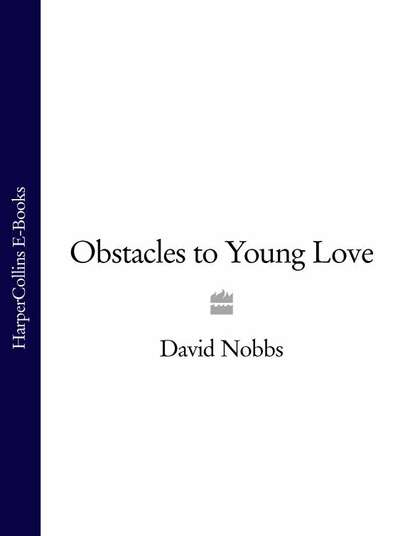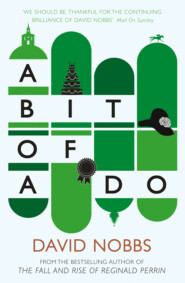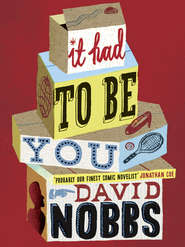По всем вопросам обращайтесь на: info@litportal.ru
(©) 2003-2025.
✖
Obstacles to Young Love
Автор
Год написания книги
2018
Настройки чтения
Размер шрифта
Высота строк
Поля
At last she’s ready and the kids are ready and she leaves the house with them. It’s a short walk across the park, and she passes the junior school on her way to the senior school where she still teaches, so it’s all very convenient.
The most wonderful sound in the world is that bang of the front door closing. She has gone. The house is his. He knows he should go next door. He’s got a fox to finish. But first he goes right round the house, opening the door of every room, savouring the emptiness of every room.
Now Timothy is at peace. Now he can face his work. At weekends and during the long, long school holidays he loves his work, it’s an escape, but during the week he resents every moment that he cannot spend in his gloriously empty home.
He enters number ninety-six. The front door no longer squeaks. He has bought ample supplies of WD40.
He is surprised, as he is every morning, by the darkness of the house. Roly is standing in the cold vault of a kitchen, waiting. Whatever time Timothy enters in the morning, his father has had his breakfast and washed up and is standing in the kitchen, waiting.
‘What are we doing today?’
The ‘we’ is royal, though Roly doesn’t realise it.
‘There’s the fox to finish, and then I thought we might tackle Mrs Lewington’s lurcher.’
‘Righty ho. Anchors away.’
‘Absolutely.’
Roly won’t do much except fetch a few things that Timothy has deliberately left in the wrong place so that his father can fetch them and think he is useful. He can still see to move around the house, in which no piece of furniture has been moved for at least twelve years, but he can’t see to do useful work any more. He has a blind stick for when he goes out on his own, but he never uses it, because he never goes out on his own. Maggie is a treasure, taking him to do all his shopping for the week at Tesco’s every Saturday.
Timothy’s spirits droop at the thought of Mrs Lewington’s lurcher. He has tried to turn the business more in the direction of wild life taxidermy, but the location is against him. People knock on the door and buttonhole him in the street. ‘He’s seventeen, Mr Pickering. We’ve had him seventeen years. If Cecil hadn’t been taken by the good Lord I know he’d want me to keep him. I’m going to put him where he always loved to sit, in his old basket, just to the left of the grate.’ Timothy hates doing pets, asks three times the normal price, and the silly people accept the estimate without a tremor, in the hopelessness of their love.
‘I’ll be out for an hour or so late morning,’ he hears himself say.
His father looks surprised, and so does he. He hadn’t known he was going out. But suddenly the urge is irresistible.
‘I’m sure there was nothing in the diary.’
His father can’t actually read the diary any more, but he can see enough to know if a day is blank.
‘No, it’s not in the diary. It’s just cropped up.’
It’s not the sort of thing you can put in a diary. ‘12.15. Drive past Naomi’s house. 12.20. Drive back past Naomi’s house.’
For that is what he is going to do. It’s something he has never done before, and it’s a serious escalation of what could easily become an obsession. Maybe he needs an obsession too, to challenge Maggie. The thought of driving down Lower Cragley Road, past L’Ancresse, in both directions, excites him. It’s naughty. It’s dangerous. It’s blissfully futile.
It’s the sitcom what’s done it, he thinks. Seeing her, every Thursday, on BBC1, in his lounge. Awful to see. Nappy Ever After is a stinker. A stinker full of jokes about stinking, as the critic in his paper gleefully pointed out. How many jokes can there be about potty training? Hundreds, according to the writers of Nappy Ever After. And what a dreary part. What miscasting. The neighbour! Always coming round to borrow sugar, but really to hear the latest gossip and to drool over the babies because her own life is so sterile. Naomi, sterile, drooling, using baby talk, silly. How dare they? He’d use a very naughty word to describe them if he wasn’t religious. The humiliation of watching it. The impossibility of not watching it. No wonder his thoughts have turned to her.
The fox is finished all too soon and he has to make a start on the lurcher. At ten to twelve he can bear it no longer and breaks off.
‘You’ll be back for your sandwich?’
‘Of course, Dad. Wouldn’t miss my sandwich.’
‘That’s my boy.’
Roly makes them a sandwich every lunchtime. It’s his task. Just occasionally Timothy has lunch with a client. ‘Lunches with clients! I don’t know! What’s next? Buckingham Palace?’ exclaims his father. But this is rare. Nineteen times out of twenty, his dad makes a sandwich for him. It’s his task. It’s his life.
‘Well then, off you go, boy, if you’re going. Chocks away.’
Timothy drives along the route of the twenty-eight bus. He’s so excited that he has to take great care not to cause an accident, whether on the road or in his trousers, or both. This is madness. He knows it, and loves it.
He turns into Lower Cragley Road. Bliss. And nobody is following. He can drive really slowly.
There it is, across the road on his right as he slips slowly down the hill. L’Ancresse. Solid. Really rather attractive. Serene. So serene. There’s the bay window of the lounge. That’s where the curlew was, on top of the chaise longue. He wonders if she still has the curlew, if it’s still in the house, or if she has taken it away with her. He wonders if she is still in their flat in…West Hampstead, was it? Strangely, it doesn’t cross his mind that she might no longer be with Simon. When he watches her in Nappy Ever After he feels jealous of Simon, so Simon remains, in his eyes, a part of her life.
He wishes that he could go back and have her eighteenth birthday again because this time he wouldn’t be nervous about the curlew, this time it would be simply the most wonderful evening of his life. But of course you can’t go back.
But he can go back up Lower Cragley Road, and he does. It doesn’t look as if there is anybody in L’Ancresse. It’ll be quite safe.
There’s no traffic at all this morning. Well, afternoon now, let’s be pedantic. What a lovely day. Words come into his mind in Ken Dodd’s voice. ‘What a lovely day for looking up an old lover.’ Careful. He doesn’t want to sound like Nappy Ever After.
He becomes very bold and pulls up right outside the house. His heart is racing. Supposing she’s there. She might be visiting. There’s no sign of a car, but maybe she hasn’t got a car. Actresses are probably funny that way. Maybe she can’t afford a car.
He is safe. Nobody goes in or out. He should leave. It would be better to leave. But he doesn’t.
He thinks about the last time he spoke to her, nine years ago, in Iquitos. He thinks about the last time he saw her in the flesh. A year ago, at the Coningsfield Grand, as Cleopatra. He’d had to go with Maggie. It had been a dreadful evening, because suddenly, seeing her on the stage, he had realised that he no longer adored Maggie, he had only been pretending to do so for a long time now, she had become obsessive about cleaning, she bravely tolerated occasional sex, it was her duty, and she lived for her thirty-four children, the two that were her own and the thirty-two that were her duty.
He had thought, as they had sat waiting for the curtain to go up – well, not the curtain exactly, he could remember every detail, they hadn’t used a curtain – as they had waited for the lights to go down, he had realised that it would be very difficult for him to break away from Maggie, present himself at the stage door, and say, ‘I’d like to see Miss Walls, please. I’m an old friend and I want to tell her how marvellous she was.’
But that had been the worst thing of all about that awful evening. She hadn’t been marvellous. She hadn’t been bad, of course she hadn’t, in fact she’d been quite good, but it was no good being quite good, not as Cleopatra; she had never for one moment been the Queen of Egypt, she had been Naomi Walls bravely portraying the Queen of Egypt. The stillness, the power that she had shown as Juliet, it hadn’t been there. Of course she was as good an actress as ever, you couldn’t lose abilities like that; there must have been some other explanation, anything, a dislike of the actor playing Antony, an unsympathetic director whose vision had clashed with hers, an illness perhaps from which she had only just been recovering, or perhaps, even for the best of them, in long runs, there were performances where you’d got it, and performances where you hadn’t. It had let his emotions off the hook about going round to see her, because he couldn’t have gone if he couldn’t have told her that she had been marvellous, but it had been terrible to witness. At the end, the applause had risen when Antony had come on for his solo bow. It hadn’t dipped for her, but it hadn’t risen further, and it should have done, and she had known it, and he had known that she had known it.
Вы ознакомились с фрагментом книги.
Приобретайте полный текст книги у нашего партнера:
Приобретайте полный текст книги у нашего партнера:











